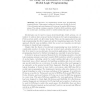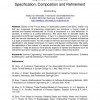1676 search results - page 259 / 336 » Formal Development of Self-organising Systems |
121
click to vote
ICLP
2004
Springer
15 years 5 months ago
2004
Springer
We introduce our implemented modal logic programming system MProlog. This system is written in Prolog as a module for Prolog. Codes, libraries, and most features of Prolog can be u...
100
click to vote
WADT
1999
Springer
15 years 4 months ago
1999
Springer
Based on the FOCUS theory of distributed systems (see [Broy, Stølen 01]) that are composed of interacting components we introduce a formal model of services and layered architectu...
103
click to vote
ECAI
1998
Springer
15 years 4 months ago
1998
Springer
Many kinds of knowledge-based system would be easier to develop and maintain if domain experts (as opposed to knowledge engineers) were in a position to define and edit the knowled...
108
click to vote
JASIS
2000
14 years 11 months ago
2000
s In data mining, we emphasize the need for learning from huge, incomplete and imperfect data sets (Fayyad et al. 1996, Frawley et al. 1991, Piatetsky-Shapiro and Frawley, 1991). T...
203
click to vote
CP
2009
Springer
16 years 16 days ago
2009
Springer
This paper presents a new way of formalizing the Coalition Structure Generation problem (CSG), so that we can apply constraint optimization techniques to it. Forming effective coal...


